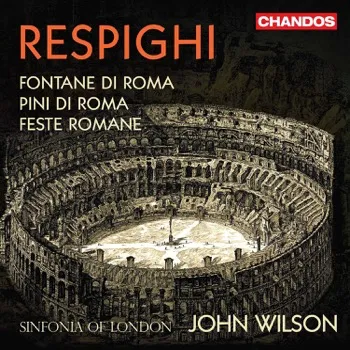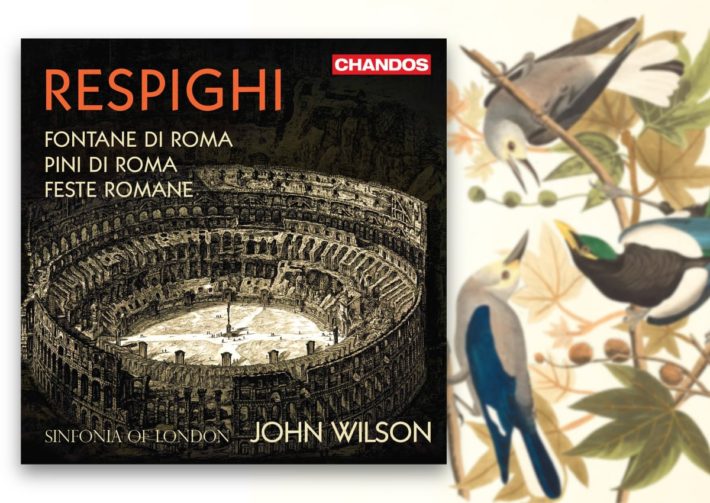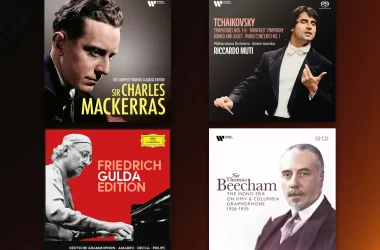Riding on the recent success of his “Escales” and Korngold albums for Chandos, John Wilson and the City of London Sinfonia turn their attention to the ‘Roman Trilogy’ by Ottorino Respighi. These works have similar mountains and valleys of emotion, so it takes a conductor with insight to stop the three Tone Poems from sounding homogeneous and repetitive on a single album.

Beginning with “Feste Romane”, the cinematic element is immediately obvious both in the music and in Wilson’s understanding of the narrative. The crescendos of the opening of “Circenses” are all treated differently, increasing the tension and intrigue, while the climaxes that follow are foreboding and sinister. The strings change colors with ease and are impressive for their evenness in the rocking passages of “Il guibileo”, the second section of which is presented with such intense atmosphere. With its Petrushka-like orchestration, “L’Ottobrata” (track 3), is treated with an air of spontaneity, adding in some judiciously judged rubato. Not holding back in “La Befana” (4), Wilson continues to navigate the changes of meter, key and tempo with ease, creating the clearest visuals in the mind’s eye. After few listens to this album, one can appreciate Wilson’s patience in not peaking too early, while bracing the excitement.
When coming to the second piece of the trilogy, Wilson and the London Sinfonia are not as immediately clear, as if seeing “Fontane di Roma” through a different lense; this sets them apart from the flamboyance of Pappano (with the Orchestra dell’Accademia Nazionale di Santa Cecilia), or the boldness of Karajan (with the Berlin Philharmonic). As mystery disperses and atmospheric mists lift, “La fontana di Valle Giulia all’alba” is revealed, and Wilson keeps the accompanying figures muted, the languorous woodwind melodies sing, similarly to Seiji Owaza’s Boston version, but with greater intensity in this opening section. Wilson keeps a tight rein on the dynamics while maintaining the interest in this rather hushed reading.
For example, most conductors contrast “La fontana del Tritone al mattino” starkly (tack 6), but here Wilson holds back a little, reserving the peaks for later in the next “La fontana di Trevi al meriggio”. The orchestral balance is superb here, the grandeur of the Trevi fountain can be fully appreciated and the organ is noticeably powerful, adding to the resonance and enhancing the overall excitement. As the almost tidal waters abate, Wilson flows effortlessly into “La fontana di Villa Medici al tramonto” (track 8). In this quieter, more sedate fountain, the orchestral colors Wilson and co. cajole are sheer beauty, gently capturing each droplet of sound.
I suspect many listeners will go straight into the most often played piece of this cycle, “Pini di Roma”. Wilson again goes about things moderately in the opening section (“I pini di Villa Borghese”, track 9), which effectively contrasts with the darker second section, “I pini presso una catacomba”. But it is the captivating tenderness of the final bars of “I pini del Gianicolo” (11) that prove the highlight of this album, using the acoustics and space of the recording venue to sustain heavenly pianissimo, accompanied by the superbly recorded nightingale sound. In the eloquently paced final episode (“I pini della Via Appia”), the sound grows gradually and is gloriously radiant, making a spectacular conclusion.
Wilson is not afraid of risks, setting his interpretations apart in a crowded market of fine recordings. His approach relishes the individual characters of each tone-poems and maintains interest throughout. The orchestral players are not named in the informative booklet, a shame as many of the players, including the three off-stage trumpeters and mandolin player in “Feste Romane”, are worthy of credit. The acoustics of St Augustine, Kilburn, London, are large, but fit the scale of the music. The balancing and engineering are superb, on stereo and more so on SACD. A remarkable album to treasure.
Respighi – “Roman Trilogy”:
“Feste Romane” P 157
“Fontane di Roma” P 106
“Pini di Roma” P 141
Sinfonia of London
John Wilson – Conductor
Chandos, hybrid SACD CHSA 5261




















